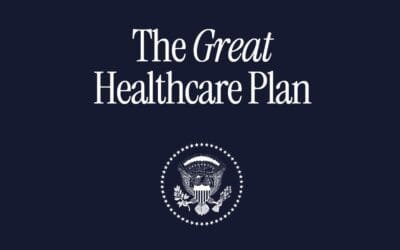On July 4, 1992, I had been driving home from my ophthalmology office, when I heard these words on the radio: “We hold these Truths to be self-evident, that all Men are created equal, that they are endowed by their Creator with certain inalienable Rights, that among these are Life, Liberty and the Pursuit of Happiness…” As I listened to the Declaration of Independence, I was struck with the long list of tyrannies by the British government, particularly the charge that the King of Great Britain “Has erected a Multitude of New Offices, and sent hither Swarms of Officers to harass our People, and eat out the Substance.” I thought of similar tyrannies I and my patients had suffered at the hands of the very government our forefathers established to protect us from tyranny. I decided to do what I could in the realm of medical care to defend our liberties.
My first step was to draft a proposal that I thought would give control over medical care back to the individual patient in consultation with his or her doctor. This first version of my proposal was based on the concept of individual medical savings accounts (MSA’s); however, it involved the government’s requiring each American to maintain an MSA. At the time, I did not realize that making MSA’s required rather than voluntary would lead to control by a government bureaucracy over people’s medical care decisions—the very thing I was trying to eliminate. I became aware of this in January 1993, at a Washington meeting on health care reform, when I met Dexter Bloome, MD, who introduced me to such books as Patient Power and What has Government Done to our Health Care?, and to people such as Jane Orient of the Association of American Physicians and Surgeons. This began a phase of tremendous learning on my part, and of networking with others who shared my belief in liberty as applied to medicine.
I then drafted a revised health-care proposal which included voluntary tax-free MSA’s and high-deductible personal health insurance, made possible by deregulating the insurance industry. I promoted the plan in Washington, finally arranging (thanks to my father’s persistence with the phone) the meeting at the White House.
I presented my plan to two people from the office or Ira Maggaziner (the director of the Health Care Task Force), showing them the logic, economy, and morality of the medical savings account approach. When I showed how individuals of modest means could securely pay for their medical care, make prudent wise choices, and accumulate tens or hundred of thousands of dollars in savings tax-free over their working lives besides, they seemed very interested. (Perhaps they were thinking of how government might be able to get its hands on all the money?) But when I finished, the reaction of Clinton’s representative was only to say: “I am more interested in seeing your proposed cost control measures on the providers.”
I concluded that those in political power today just don’t get it—they believe not in freedom but in power and controls. I also saw that, while books had been written making perfectly clear how a free-market solution would be ideal for all Americans, the popular press was almost completely silent about such a solution. If only the American people could become knowledgeable about this solution and demand freedom in medicine, then possibly the Administration and Congress would oblige. I saw the need for an organization open to all Americans that is proactive and stresses what we are losing and what we must fight for: free choice, i.e., liberty. And so I founded Americans for Free Choice in Medicine.
AFCM is an association of individuals dedicated to educating ourselves and others about the importance of defending individual rights in the realm of medical care. Our three guiding values are individual liberty, personal responsibility and non-coercive free markets. Only by allegiance to these principles will patients have the ability to choose doctors who are their own advocates, not government’s or insurance companies’ or “society’s.” Only by allegiance to these principles can patients once again be confident that their doctor is not being forced to place other considerations above the individual patient’s own life.
In our first year, I and other AFCM members have spoken to thousands of people about the correctness and power of the values behind freedom in medicine. This approach is finding broad-based appeal due to its philosophic link to our American heritage, and its ability to produce simple, specific reform ideas that work.
This article is taken from a longer version published in the July 1994 print edition of AFCM‘s newsletter, Pulse.




